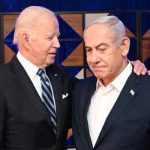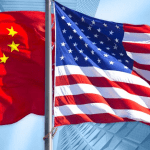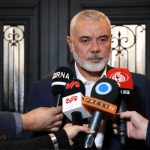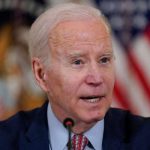The United Nations Security Council rejected a resolution on Friday asking for an immediate truce in Gaza and an Israel-Hamas hostage settlement after Russia and China vetoed the US proposal.
The resolution, on which Algeria also voted negative and Guyana abstained, called for an immediate and sustained ceasefire lasting about six weeks to protect people and allow humanitarian assistance to be delivered.
The resolution received 11 votes from the 15 council members, but its passage was halted by Russia and China’s vetoes.
Diplomats indicated that the Security Council will meet on Saturday to vote on an alternative resolution authored by elected members.
Friday was the first time Washington had backed a text that came up for a vote with the word “ceasefire” in it during the war in Gaza, reflecting a toughening of the Biden administration’s stance toward Israel.
Earlier in the five-month-old war, the US was averse to the word ceasefire and vetoed measures that included calls for an immediate ceasefire.
“The vast majority of this council voted in favour of this resolution, but unfortunately Russia and China decided to exercise its veto,” US Ambassador to the United Nations Linda Thomas-Greenfield told the Security Council.
She accused Russia and China of vetoing the resolution for “cynical” and “petty” reasons. She said they opposed it simply because it was penned by the US and criticised both countries for not condemning Hamas’s Oct 7 attack on Israel.
Nearly 32,000 Palestinians have been killed in Israel’s subsequent offensive in the Gaza Strip, according to health authorities in the Hamas-ruled enclave.
Russia’s ambassador to the UN, Vassily Nebenzia, said the US-led resolution was “exceedingly politicised” and contained an effective green light for Israel to mount a military operation in Rafah, a city on the southern tip of the Gaza Strip where more than half of the enclave’s 2.3 million residents have been sheltering in makeshift tents.
China’s UN ambassador, Zhang Jun, criticised the text proposed by the US for not clearly stating its opposition to a planned military operation by Israel in Rafah, which he said could lead to severe consequences. He said Beijing also supported the alternative.
The United Nations Security Council rejected a resolution on Friday asking for an immediate truce in Gaza and an Israel-Hamas hostage settlement after Russia and China vetoed the US proposal.
The resolution, on which Algeria also voted negative and Guyana abstained, called for an immediate and sustained ceasefire lasting about six weeks to protect people and allow humanitarian assistance to be delivered.
The resolution received 11 votes from the 15 council members, but its passage was halted by Russia and China’s vetoes.
Diplomats indicated that the Security Council will meet on Saturday to vote on an alternative resolution authored by elected members.
Friday was the first time Washington had backed a text that came up for a vote with the word “ceasefire” in it during the war in Gaza, reflecting a toughening of the Biden administration’s stance toward Israel.
Earlier in the five-month-old war, the US was averse to the word ceasefire and vetoed measures that included calls for an immediate ceasefire.
“The vast majority of this council voted in favour of this resolution, but unfortunately Russia and China decided to exercise its veto,” US Ambassador to the United Nations Linda Thomas-Greenfield told the Security Council.
She accused Russia and China of vetoing the resolution for “cynical” and “petty” reasons. She said they opposed it simply because it was penned by the US and criticised both countries for not condemning Hamas’s Oct 7 attack on Israel.
Nearly 32,000 Palestinians have been killed in Israel’s subsequent offensive in the Gaza Strip, according to health authorities in the Hamas-ruled enclave.
Russia’s ambassador to the UN, Vassily Nebenzia, said the US-led resolution was “exceedingly politicised” and contained an effective green light for Israel to mount a military operation in Rafah, a city on the southern tip of the Gaza Strip where more than half of the enclave’s 2.3 million residents have been sheltering in makeshift tents.
China’s UN ambassador, Zhang Jun, criticised the text proposed by the US for not clearly stating its opposition to a planned military operation by Israel in Rafah, which he said could lead to severe consequences. He said Beijing also supported the alternative.
The United Nations Security Council rejected a resolution on Friday asking for an immediate truce in Gaza and an Israel-Hamas hostage settlement after Russia and China vetoed the US proposal.
The resolution, on which Algeria also voted negative and Guyana abstained, called for an immediate and sustained ceasefire lasting about six weeks to protect people and allow humanitarian assistance to be delivered.
The resolution received 11 votes from the 15 council members, but its passage was halted by Russia and China’s vetoes.
Diplomats indicated that the Security Council will meet on Saturday to vote on an alternative resolution authored by elected members.
Friday was the first time Washington had backed a text that came up for a vote with the word “ceasefire” in it during the war in Gaza, reflecting a toughening of the Biden administration’s stance toward Israel.
Earlier in the five-month-old war, the US was averse to the word ceasefire and vetoed measures that included calls for an immediate ceasefire.
“The vast majority of this council voted in favour of this resolution, but unfortunately Russia and China decided to exercise its veto,” US Ambassador to the United Nations Linda Thomas-Greenfield told the Security Council.
She accused Russia and China of vetoing the resolution for “cynical” and “petty” reasons. She said they opposed it simply because it was penned by the US and criticised both countries for not condemning Hamas’s Oct 7 attack on Israel.
Nearly 32,000 Palestinians have been killed in Israel’s subsequent offensive in the Gaza Strip, according to health authorities in the Hamas-ruled enclave.
Russia’s ambassador to the UN, Vassily Nebenzia, said the US-led resolution was “exceedingly politicised” and contained an effective green light for Israel to mount a military operation in Rafah, a city on the southern tip of the Gaza Strip where more than half of the enclave’s 2.3 million residents have been sheltering in makeshift tents.
China’s UN ambassador, Zhang Jun, criticised the text proposed by the US for not clearly stating its opposition to a planned military operation by Israel in Rafah, which he said could lead to severe consequences. He said Beijing also supported the alternative.
The United Nations Security Council rejected a resolution on Friday asking for an immediate truce in Gaza and an Israel-Hamas hostage settlement after Russia and China vetoed the US proposal.
The resolution, on which Algeria also voted negative and Guyana abstained, called for an immediate and sustained ceasefire lasting about six weeks to protect people and allow humanitarian assistance to be delivered.
The resolution received 11 votes from the 15 council members, but its passage was halted by Russia and China’s vetoes.
Diplomats indicated that the Security Council will meet on Saturday to vote on an alternative resolution authored by elected members.
Friday was the first time Washington had backed a text that came up for a vote with the word “ceasefire” in it during the war in Gaza, reflecting a toughening of the Biden administration’s stance toward Israel.
Earlier in the five-month-old war, the US was averse to the word ceasefire and vetoed measures that included calls for an immediate ceasefire.
“The vast majority of this council voted in favour of this resolution, but unfortunately Russia and China decided to exercise its veto,” US Ambassador to the United Nations Linda Thomas-Greenfield told the Security Council.
She accused Russia and China of vetoing the resolution for “cynical” and “petty” reasons. She said they opposed it simply because it was penned by the US and criticised both countries for not condemning Hamas’s Oct 7 attack on Israel.
Nearly 32,000 Palestinians have been killed in Israel’s subsequent offensive in the Gaza Strip, according to health authorities in the Hamas-ruled enclave.
Russia’s ambassador to the UN, Vassily Nebenzia, said the US-led resolution was “exceedingly politicised” and contained an effective green light for Israel to mount a military operation in Rafah, a city on the southern tip of the Gaza Strip where more than half of the enclave’s 2.3 million residents have been sheltering in makeshift tents.
China’s UN ambassador, Zhang Jun, criticised the text proposed by the US for not clearly stating its opposition to a planned military operation by Israel in Rafah, which he said could lead to severe consequences. He said Beijing also supported the alternative.
The United Nations Security Council rejected a resolution on Friday asking for an immediate truce in Gaza and an Israel-Hamas hostage settlement after Russia and China vetoed the US proposal.
The resolution, on which Algeria also voted negative and Guyana abstained, called for an immediate and sustained ceasefire lasting about six weeks to protect people and allow humanitarian assistance to be delivered.
The resolution received 11 votes from the 15 council members, but its passage was halted by Russia and China’s vetoes.
Diplomats indicated that the Security Council will meet on Saturday to vote on an alternative resolution authored by elected members.
Friday was the first time Washington had backed a text that came up for a vote with the word “ceasefire” in it during the war in Gaza, reflecting a toughening of the Biden administration’s stance toward Israel.
Earlier in the five-month-old war, the US was averse to the word ceasefire and vetoed measures that included calls for an immediate ceasefire.
“The vast majority of this council voted in favour of this resolution, but unfortunately Russia and China decided to exercise its veto,” US Ambassador to the United Nations Linda Thomas-Greenfield told the Security Council.
She accused Russia and China of vetoing the resolution for “cynical” and “petty” reasons. She said they opposed it simply because it was penned by the US and criticised both countries for not condemning Hamas’s Oct 7 attack on Israel.
Nearly 32,000 Palestinians have been killed in Israel’s subsequent offensive in the Gaza Strip, according to health authorities in the Hamas-ruled enclave.
Russia’s ambassador to the UN, Vassily Nebenzia, said the US-led resolution was “exceedingly politicised” and contained an effective green light for Israel to mount a military operation in Rafah, a city on the southern tip of the Gaza Strip where more than half of the enclave’s 2.3 million residents have been sheltering in makeshift tents.
China’s UN ambassador, Zhang Jun, criticised the text proposed by the US for not clearly stating its opposition to a planned military operation by Israel in Rafah, which he said could lead to severe consequences. He said Beijing also supported the alternative.
The United Nations Security Council rejected a resolution on Friday asking for an immediate truce in Gaza and an Israel-Hamas hostage settlement after Russia and China vetoed the US proposal.
The resolution, on which Algeria also voted negative and Guyana abstained, called for an immediate and sustained ceasefire lasting about six weeks to protect people and allow humanitarian assistance to be delivered.
The resolution received 11 votes from the 15 council members, but its passage was halted by Russia and China’s vetoes.
Diplomats indicated that the Security Council will meet on Saturday to vote on an alternative resolution authored by elected members.
Friday was the first time Washington had backed a text that came up for a vote with the word “ceasefire” in it during the war in Gaza, reflecting a toughening of the Biden administration’s stance toward Israel.
Earlier in the five-month-old war, the US was averse to the word ceasefire and vetoed measures that included calls for an immediate ceasefire.
“The vast majority of this council voted in favour of this resolution, but unfortunately Russia and China decided to exercise its veto,” US Ambassador to the United Nations Linda Thomas-Greenfield told the Security Council.
She accused Russia and China of vetoing the resolution for “cynical” and “petty” reasons. She said they opposed it simply because it was penned by the US and criticised both countries for not condemning Hamas’s Oct 7 attack on Israel.
Nearly 32,000 Palestinians have been killed in Israel’s subsequent offensive in the Gaza Strip, according to health authorities in the Hamas-ruled enclave.
Russia’s ambassador to the UN, Vassily Nebenzia, said the US-led resolution was “exceedingly politicised” and contained an effective green light for Israel to mount a military operation in Rafah, a city on the southern tip of the Gaza Strip where more than half of the enclave’s 2.3 million residents have been sheltering in makeshift tents.
China’s UN ambassador, Zhang Jun, criticised the text proposed by the US for not clearly stating its opposition to a planned military operation by Israel in Rafah, which he said could lead to severe consequences. He said Beijing also supported the alternative.
The United Nations Security Council rejected a resolution on Friday asking for an immediate truce in Gaza and an Israel-Hamas hostage settlement after Russia and China vetoed the US proposal.
The resolution, on which Algeria also voted negative and Guyana abstained, called for an immediate and sustained ceasefire lasting about six weeks to protect people and allow humanitarian assistance to be delivered.
The resolution received 11 votes from the 15 council members, but its passage was halted by Russia and China’s vetoes.
Diplomats indicated that the Security Council will meet on Saturday to vote on an alternative resolution authored by elected members.
Friday was the first time Washington had backed a text that came up for a vote with the word “ceasefire” in it during the war in Gaza, reflecting a toughening of the Biden administration’s stance toward Israel.
Earlier in the five-month-old war, the US was averse to the word ceasefire and vetoed measures that included calls for an immediate ceasefire.
“The vast majority of this council voted in favour of this resolution, but unfortunately Russia and China decided to exercise its veto,” US Ambassador to the United Nations Linda Thomas-Greenfield told the Security Council.
She accused Russia and China of vetoing the resolution for “cynical” and “petty” reasons. She said they opposed it simply because it was penned by the US and criticised both countries for not condemning Hamas’s Oct 7 attack on Israel.
Nearly 32,000 Palestinians have been killed in Israel’s subsequent offensive in the Gaza Strip, according to health authorities in the Hamas-ruled enclave.
Russia’s ambassador to the UN, Vassily Nebenzia, said the US-led resolution was “exceedingly politicised” and contained an effective green light for Israel to mount a military operation in Rafah, a city on the southern tip of the Gaza Strip where more than half of the enclave’s 2.3 million residents have been sheltering in makeshift tents.
China’s UN ambassador, Zhang Jun, criticised the text proposed by the US for not clearly stating its opposition to a planned military operation by Israel in Rafah, which he said could lead to severe consequences. He said Beijing also supported the alternative.
The United Nations Security Council rejected a resolution on Friday asking for an immediate truce in Gaza and an Israel-Hamas hostage settlement after Russia and China vetoed the US proposal.
The resolution, on which Algeria also voted negative and Guyana abstained, called for an immediate and sustained ceasefire lasting about six weeks to protect people and allow humanitarian assistance to be delivered.
The resolution received 11 votes from the 15 council members, but its passage was halted by Russia and China’s vetoes.
Diplomats indicated that the Security Council will meet on Saturday to vote on an alternative resolution authored by elected members.
Friday was the first time Washington had backed a text that came up for a vote with the word “ceasefire” in it during the war in Gaza, reflecting a toughening of the Biden administration’s stance toward Israel.
Earlier in the five-month-old war, the US was averse to the word ceasefire and vetoed measures that included calls for an immediate ceasefire.
“The vast majority of this council voted in favour of this resolution, but unfortunately Russia and China decided to exercise its veto,” US Ambassador to the United Nations Linda Thomas-Greenfield told the Security Council.
She accused Russia and China of vetoing the resolution for “cynical” and “petty” reasons. She said they opposed it simply because it was penned by the US and criticised both countries for not condemning Hamas’s Oct 7 attack on Israel.
Nearly 32,000 Palestinians have been killed in Israel’s subsequent offensive in the Gaza Strip, according to health authorities in the Hamas-ruled enclave.
Russia’s ambassador to the UN, Vassily Nebenzia, said the US-led resolution was “exceedingly politicised” and contained an effective green light for Israel to mount a military operation in Rafah, a city on the southern tip of the Gaza Strip where more than half of the enclave’s 2.3 million residents have been sheltering in makeshift tents.
China’s UN ambassador, Zhang Jun, criticised the text proposed by the US for not clearly stating its opposition to a planned military operation by Israel in Rafah, which he said could lead to severe consequences. He said Beijing also supported the alternative.














